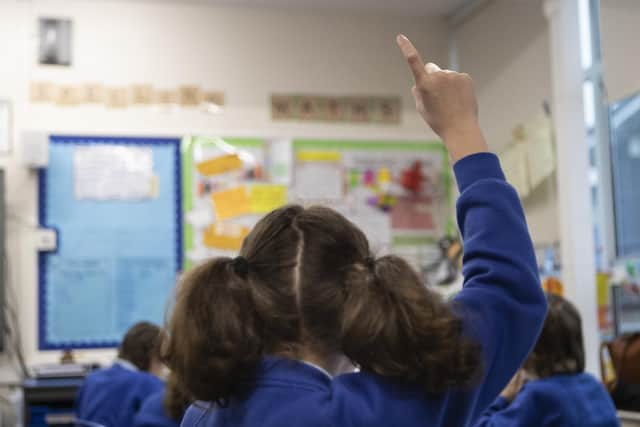Support for scrapping of 'school bubbles' after 15 months of "significant disruption" to learning
and live on Freeview channel 276
From July 19, schools will no longer be expected to undertake contact tracing and NHS Test and Trace will instead identify close contacts of positive cases, face coverings will also no longer be advised for pupils, staff and visitors, either in classrooms or in communal areas and from August 16, children will only need to self-isolate if they have tested positive for Covid-19
Current rules state that children have to self-isolate for 10 days if another pupil in their bubble - which can be an entire year group at secondary school - tests positive for coronavirus.
Advertisement
Hide AdAdvertisement
Hide AdBut updated Department for Education (DfE) guidance says keeping children in consistent bubbles will not be needed for summer provision, or in the autumn.


It comes as latest Government figures show that more than 640,000 pupils in England were not in school due to Covid-19 last week - up from around 384,000 the week before.
“As we have done since the start of the pandemic, we will review the new Government guidance and amend our risk assessment accordingly to ensure that we continue to keep our pupils, staff and school community as safe as possible which continues to be a key priority for us.”
Department for Education statistics reveal that around one in 12 (8.5 per cent) state school pupils did not attend class for Covid-19-related reasons on July 1, up from 5.1per cent on June 24 and 3.3 per cent on June 17, according to Department for Education (DfE) statistics.
Advertisement
Hide AdAdvertisement
Hide AdThese include approximately 561,000 children self-isolating due to a possible contact with a Covid-19 case, 34,000 pupils with a suspected case of coronavirus and 28,000 with a confirmed case of Covid-19.
In secondary schools, only 76.9 per cent attended class, down from 82.4 per cent, while 87.8 per cent of pupils attended primary school, down from 90.9 per cent.
The number of pupils self-isolating due to a potential contact with a Covid-19 case from inside the school rose in just one week, from 279,000 on June 24 to 471,000 children on July 1.
A further 90,000 pupils were self-isolating due to a possible contact outside school, up from 57,000 the previous week. Meanwhile, 34,000 pupils were absent because they suspected they had Covid-19, up from 24,000 on June 24, and 28,000 were off after testing positive for Covid-19, up from 15,000.
Advertisement
Hide AdAdvertisement
Hide AdEducation secretary, Gavin Williamson said: "We recognise that the system of bubbles and isolation is causing disruption to many children's education. That is why we'll be ending bubbles and transferring contact tracing to the NHS Test and Trace system for early years settings, schools and colleges.
"I do not think it is acceptable that children should face greater restrictions over and above those of wider society, especially since they have given up so much to keep older generations safe during this pandemic."
However, Nick Brook, deputy general secretary of school leaders' union NAHT, said: "No school leader wants to have restrictions in place any longer than are needed, but there will be a sense of real concern amongst many that the worsening situation they see before their eyes is at odds with the Government's narrative of relaxation and return to normality."
Comment Guidelines
National World encourages reader discussion on our stories. User feedback, insights and back-and-forth exchanges add a rich layer of context to reporting. Please review our Community Guidelines before commenting.
